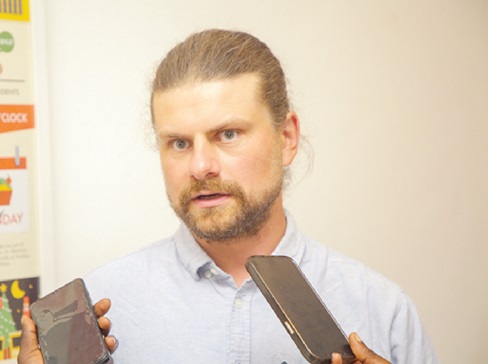“We cannot keep solving coastal erosion by simply shifting the damage from one shoreline to the next,” a researcher at the Institute of Environmental Social Sciences and Geography of the University of Freiburg, Friedrich Nikolaus Neu, has said.
He, therefore, called for a fundamental shift in the country’s response to coastal erosion, urging policymakers to move beyond short-term engineering fixes and adopt sustainable and inclusive strategies.
Mr Neu also said that the over-reliance on sea defence walls without addressing root causes had often worsened the problem for communities.
He was making a presentation in Accra on “Pathways of adaptation to environmental and climate change in coastal Ghana,”.
Infrastructure crisis
The researcher said that although sea level rise and stronger tidal waves linked to climate change had played a role in coastal erosion, the situation had been made worse by long-standing infrastructure projects.
He pointed to the construction of the Akosombo Dam, the Tema Harbour, and other sea defence structures as major contributors to the disruption of natural sediment flow along Ghana’s coast.
Citing satellite imagery and historical data, Mr Neu said the Akosombo Dam now blocks 99.5 per cent of the sediment that would have naturally replenished beaches.
He further said that only eight per cent of the Volta River’s former annual sediment load currently reaches the ocean, thus weakening the shoreline’s natural defences.
The researcher said that while groynes and breakwaters are designed to trap sediment and protect specific areas, they also divert erosion toward unprotected neighbouring communities.
This phenomenon, he said, contributed to the complete loss of the coastal village of Fuvemeh and worsened erosion in Blekusu following the construction of the Keta Sea Defence project.
“There is a long-standing pattern where one town gets protected at the cost of the next. These short-term fixes don’t solve the problem; they just move it,” the researcher added.
Unequal resettlement
Mr Neu further raised concerns over how communities had been relocated in response to erosion, claiming that resettlement processes were heavily politicised, failing to meet the needs of many displaced families.
“There must be more community participation in how resettlement is done. People should have a say in the design, materials and location of their new homes or at least be given the resources to rebuild in ways that work for them,” he said.
Mr Neu urged the government and stakeholders to adopt long-term, nature-based solutions such as mangrove restoration, riverbank rehabilitation, and sediment replenishment, which he said were more sustainable and cost-effective than hard infrastructure that often caused unintended harm.

